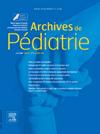Low FODMAP diet in children with functional abdominal pain disorders. Is it always worth trying?
IF 1.3
4区 医学
Q3 PEDIATRICS
引用次数: 0
Abstract
Objective
Our aim was to assess the use of a low FODMAP (fermentable oligosaccharides, disaccharides, monosaccharides and polyols) diet in children with different types of functional abdominal pain disorders (FAPD) and to identify predictive factors of response to this diet.
Methods
This was a multicenter, experimental, uncontrolled, prospective trial. Patients with irritable bowel syndrome (IBS), functional dyspepsia, and functional abdominal pain followed a low FODMAP diet for 2 weeks. We collected data on abdominal pain before and after the diet. Patients who showed a ≥ 50 % reduction in abdominal pain frequency were considered responders.
Results
A total of 48 patients with FAPD participated in this trial. They all showed a significant decrease in the frequency (p < 0.05) and intensity (p < 0.05) of abdominal pain after the diet. We considered 41.7 % of patients to be responders. Among children with functional dyspepsia, 66.6 % responded to the diet, and so did 71.4 % of those with IBS. On the contrary, 71.8 % of children with functional abdominal pain were non-responders, and this diagnosis was considered a predictive factor of poor response to the diet (OR: 9.87, CI [1.52; 63.97], p = 0.016).
Conclusion
In children with FAPD, a diagnosis of functional abdominal pain is a predictive factor of poor response to a low FODMAP diet. Better results were achieved with this diet in children with IBS or functional dyspepsia.
低FODMAP饮食对功能性腹痛障碍患儿的影响。总是值得一试吗?低FODMAP饮食对功能性腹痛患儿的影响。
目的:我们的目的是评估低FODMAP(可发酵低聚糖、双糖、单糖和多元醇)饮食在不同类型功能性腹痛障碍(FAPD)儿童中的应用,并确定对这种饮食反应的预测因素。方法:这是一项多中心、实验性、非对照、前瞻性试验。肠易激综合征(IBS)、功能性消化不良和功能性腹痛患者遵循低FODMAP饮食2周。我们收集了节食前后腹部疼痛的数据。腹痛频率减少≥50%的患者被认为有反应。结果:共有48例FAPD患者参与了本试验。饲粮后,它们腹痛的频率(p < 0.05)和强度(p < 0.05)均显著降低。我们认为41.7%的患者有反应。在患有功能性消化不良的儿童中,66.6%的人对这种饮食有反应,而患有肠易激综合征的儿童中有71.4%的人对这种饮食有反应。相反,71.8%的功能性腹痛患儿无反应,这一诊断被认为是对饮食不良反应的预测因素(OR: 9.87, CI [1.52;63.97], p = 0.016)。结论:在FAPD患儿中,功能性腹痛的诊断是对低FODMAP饮食反应不良的预测因素。在患有肠易激综合征或功能性消化不良的儿童中,这种饮食取得了更好的效果。
本文章由计算机程序翻译,如有差异,请以英文原文为准。
求助全文
约1分钟内获得全文
求助全文
来源期刊

Archives De Pediatrie
医学-小儿科
CiteScore
2.80
自引率
5.60%
发文量
106
审稿时长
24.1 weeks
期刊介绍:
Archives de Pédiatrie publishes in English original Research papers, Review articles, Short communications, Practice guidelines, Editorials and Letters in all fields relevant to pediatrics.
Eight issues of Archives de Pédiatrie are released annually, as well as supplementary and special editions to complete these regular issues.
All manuscripts submitted to the journal are subjected to peer review by international experts, and must:
Be written in excellent English, clear and easy to understand, precise and concise;
Bring new, interesting, valid information - and improve clinical care or guide future research;
Be solely the work of the author(s) stated;
Not have been previously published elsewhere and not be under consideration by another journal;
Be in accordance with the journal''s Guide for Authors'' instructions: manuscripts that fail to comply with these rules may be returned to the authors without being reviewed.
Under no circumstances does the journal guarantee publication before the editorial board makes its final decision.
Archives de Pédiatrie is the official publication of the French Society of Pediatrics.
 求助内容:
求助内容: 应助结果提醒方式:
应助结果提醒方式:


